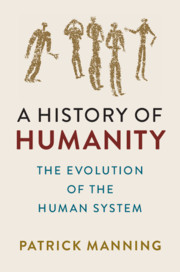Book contents
- A History of Humanity
- A History of Humanity
- Copyright page
- Contents
- Maps, Figures, and Tables
- Preface
- Acknowledgments
- Introduction
- Pleistocene Evolution
- Holocene Evolution
- Anthropocene Evolution
- 9 Systemic Threats
- 10 Hope for Adaptations
- Appendix: Frameworks for Analysis
- Notes
- Glossary
- References
- Index
9 - Systemic Threats
from Anthropocene Evolution
Published online by Cambridge University Press: 14 February 2020
- A History of Humanity
- A History of Humanity
- Copyright page
- Contents
- Maps, Figures, and Tables
- Preface
- Acknowledgments
- Introduction
- Pleistocene Evolution
- Holocene Evolution
- Anthropocene Evolution
- 9 Systemic Threats
- 10 Hope for Adaptations
- Appendix: Frameworks for Analysis
- Notes
- Glossary
- References
- Index
Summary
The sudden changes and new problems of the Anthropocene, viewed through evolutionary theory, highlight issues of social fitness: who is benefited by an institution? Anthropocene growth – in economy, population, waste, and inequality – fostered midcentury social confrontations and ideological conflict. Capitalism, now paired with empire, won global dominion. Further institutional change led, after two great wars, to contesting racial categorization, emancipating large and small nations, and demanding post-imperial regulation of economic inequality. Should institutions respond to social and environmental needs – or regulate themselves? The chapter contrasts theories: social evolution in trade unions and cultural evolution as applied to an urban ethnic community. Neoliberal visionaries proposed a postwar solution, treating markets as devices for governing not only economic but social behavior. From 1980, authorities in the USA, UK, and IMF encouraged divergence in wealth holdings and opposed regulation of private firms. With Soviet collapse and Chinese reforms, neoliberalism led the world economy, placing social inequality and ecological degradation as low priorities.
Keywords
- Type
- Chapter
- Information
- A History of HumanityThe Evolution of the Human System, pp. 203 - 234Publisher: Cambridge University PressPrint publication year: 2020



